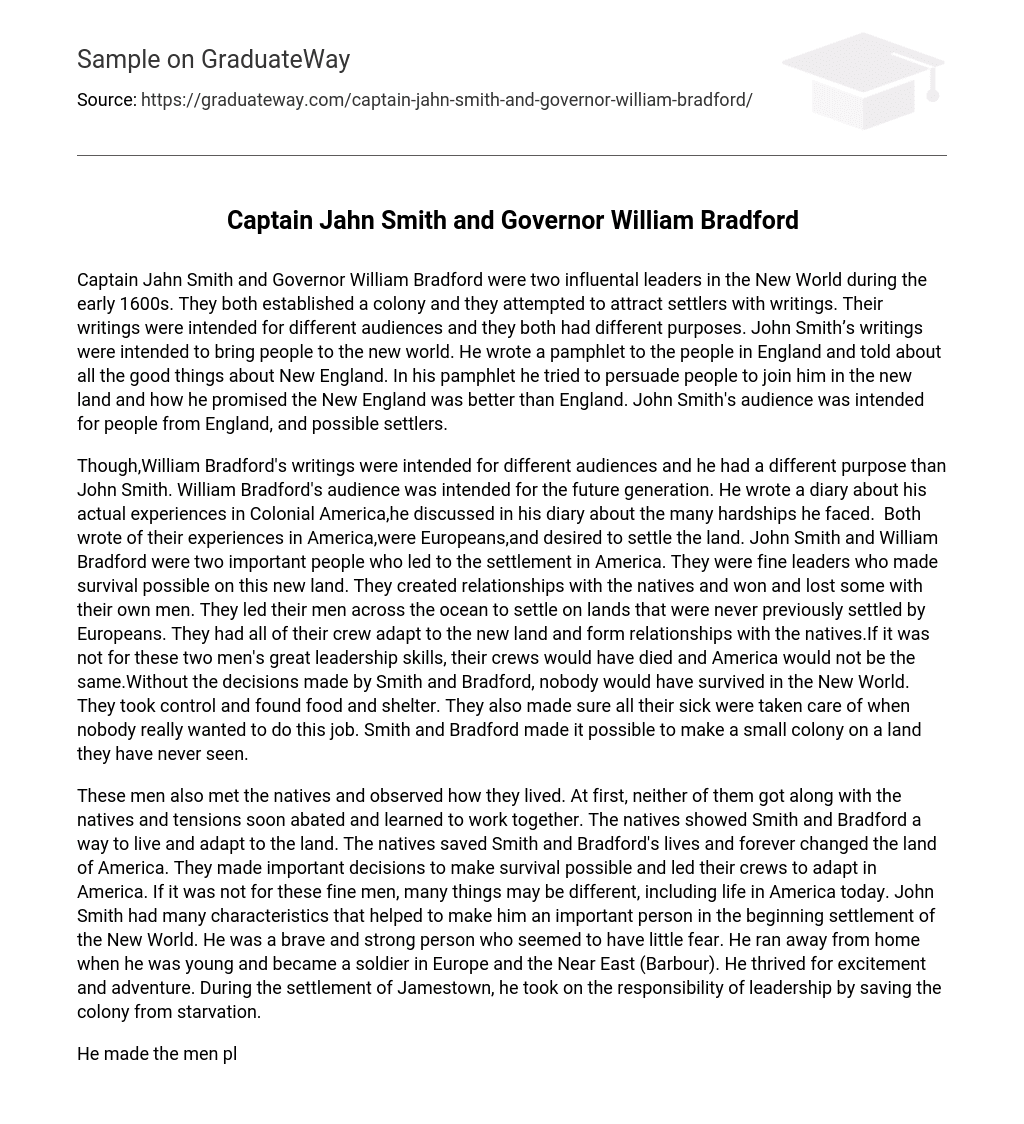In the early 1600s, Captain Jahn Smith and Governor William Bradford emerged as influential leaders in the New World. Their writings were aimed at attracting settlers, but their intended audiences and purposes varied. Smith’s pamphlet appealed to the people of England, promoting the benefits of New England and encouraging them to join him in this promising land. His target audience encompassed both individuals from England and potential settlers.
Despite William Bradford and John Smith having different intentions and audiences, Bradford’s writings in his diary about his experiences in Colonial America were intended for future generations. In his diary, Bradford openly discussed the numerous hardships he faced.
John Smith and William Bradford, both Europeans seeking to settle in America, documented their experiences in the new land. These two leaders were essential in establishing settlements in America and ensuring the survival of their followers. By building relationships with both native inhabitants and their own men, Smith and Bradford successfully overcame the challenges of adapting to unfamiliar lands that had never been settled by Europeans before.
Thanks to the exceptional leadership skills of Smith and Bradford, the crews under their command not only survived but also thrived in the New World. Their actions, which included securing food and shelter, were crucial for the survival of all individuals. Moreover, they willingly took on the responsibility of caring for the sick, a task that others did not assume. In conclusion, Smith and Bradford’s efforts led to the establishment of a small colony in an entirely unfamiliar land.
These men also encountered the indigenous population and observed their way of life. Initially, neither of them had a harmonious relationship with the natives. However, tensions eventually eased, and they learned to collaborate. The natives taught Smith and Bradford how to live and adapt to the local environment. Furthermore, the natives played a crucial role in saving their lives and permanently transforming the American landscape. They made crucial decisions that ensured survival and guided their crews in adapting to life in America. Without these exceptional individuals, many aspects, including modern-day American life, might have been different.
John Smith possessed several attributes that contributed to his significance in the early settlement of the New World. Notably, he exhibited courage and physical strength, demonstrating an absence of fear. In his youth, he fled from his home and served as a soldier in Europe and the Near East (Barbour). Smith actively sought out exhilaration and escapades. In Jamestown, he undertook a leadership role and successfully rescued the colony from famine, assuming responsibility for its well-being.
John Smith, chosen as President of the Jamestown settlement, directed the men to plant crops and construct houses while he engaged in trade with the Indians for sustenance. The settlers held great faith and confidence in him due to his previous efforts in saving them. Smith, noted for his intelligence, documented numerous occurrences in Jamestown and even published an article detailing his 1614 voyage. “The General History of Virginia” stands as his most extensive and renowned work (Gwinn).
Without these accounts, our knowledge of the colony in the New World would be minimal. John Smith was not just a writer, but also adept at drawing. His numerous maps depicted his expeditions and escapades, proving invaluable to other groups of settlers who arrived in the New World. Smith exemplified courage, strength, intellect, and exceptional leadership skills.
His name is most likely remembered as the person who was about to be executed by Indians, but he was saved by the chief’s daughter. Some historians doubt this event and claim that Smith was merely boasting and fabricating stories (McMichael). Smith had numerous adventures and sometimes exaggerated the truth. Regardless of any exaggeration, John Smith remains a captivating and significant figure in American history.
As a young man, he joined the separatist congregation at Scrooby and emigrated to Holland in 1609. He acquired a wide acquaintance with theological literature at Leiden. In 1620, Bradford came to New England on the Mayflower and in 1621, he was chosen as the leader of the Pilgrims after the death of John Carver.
He remained governor for most of his life, being reelected 30 times; during the five years in which he chose not to serve, he was elected assistant. Bradford, though firm, used his large powers with discretion, and there were few complaints about his leadership. He maintained friendly relations with the Native Americans and worked hard to establish fishing, trade, and agriculture. He emphasized the colonists’ obligations to their London backers and was one of the eight colonial “undertakers” who in 1627 took on Plymouth Colony’s debt to the merchants adventurers.
Having been granted a monopoly on fishing and trading rights, they were able to finally pay off their debt by 1648. Bradford, unlike the Puritan leaders of Boston (although he was not always consistent in this regard), was more accepting of different religious beliefs, and played a major role in keeping Plymouth separate from the Massachusetts Bay colony. His renowned History of Plimoth Plantation, which was not fully published until 1856, serves as the foundation for all historical accounts of the Plymouth Colony.





